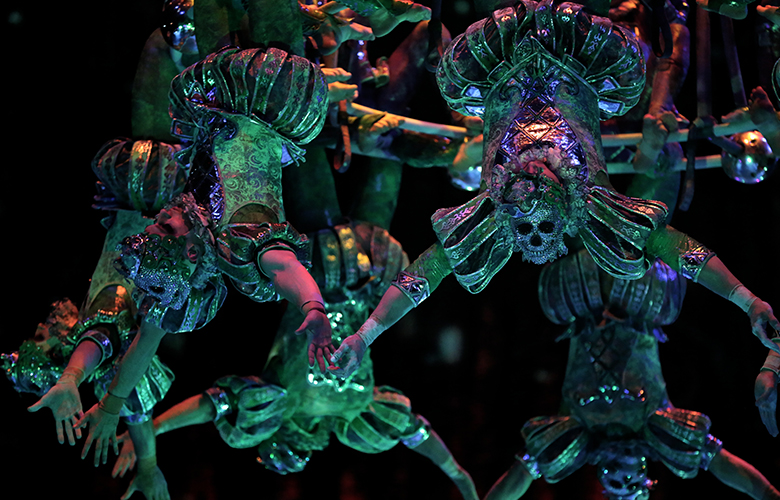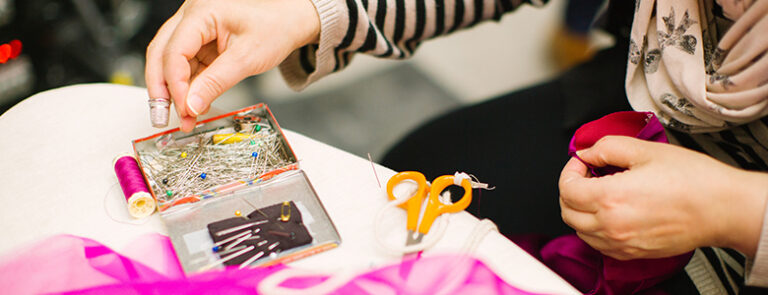
As the head of wardrobe of The House of Dancing Water (THODW) in Macau, China as well as having been a recruiter for wardrobe supervisors for Norwegian Cruise Line (NCL); there has been a mountain of resumés that have come across my desk. When I sift through them, I can quickly see which candidates catch my eye and ones that do not. Here are some suggestions on formatting your resumé, which I hope you will find useful as you navigate through the wardrobe industry.
Ask yourself the following questions:
1. Do I have all my “ducks in a row” (a.k.a a Master List)?
2. Have I researched the company or the production show that I am applying to?
3. Does my resumé “Represent Me”?
4. Is my resumé easy to read?
5. Have I included my “Soft Skills”?
In my 20s I began documenting my Curriculum Vitae, more commonly referred to by its shorthand abbreviation CV. A CV is a comprehensive document which chronologically lists in detail your education, achievement, awards, and honors. Through the years I continue to update my running list and I use this document as my “Master” that I pull information together to modify my resumé. CVs are usually used by academics but many international companies may request this over a resume. If you are not sure if a potential employer prefers a resumé or CV…send a simple email to the company or recruiter to enquire which they would prefer.

In the age where all of us have a computer in our pocket, “YouTube”, “Instagram”, “Facebook”, and “LinkedIn” are all at your fingertips to assist you in understanding what the industry, as well as specific companies are seeking in their ideal candidates.
When I’m applying for a position, I would first look up the website of the production company or costume shop and research the style of shows and the style of costumes. I look at who works for the company and if there are any posted pictures of the work environment. I would also check the mission statement of the artistic director to educate myself on if this is the company I want to work for and if I have the right skill set to make a difference in that organization.
An important note about social media, remember it works both ways for managers and recruiters. They will research you as well. I will be checking the same sites on those applying…be careful about posting those great pictures of six cabana boys doing shots out of your belly button if you are looking for a leadership position.
Does your resumé have the following sections provided for the reader?
Give a brief statement to… “Why are you applying for this position?” Be honest…if you are looking in developing your skills, be open about it. And if you think, “well…I put all of that in my cover letter already”, please know that your cover letter doesn’t always make it with your resumé and a brief “Objective” section at the top of your resumé will refresh the reader why you are applying. Remember on average most recruiters don’t spend more than six seconds looking at each resumé.
Give a brief summary of…“who are you and what are your career goals” this should be below your objective section of what you can bring to the organization. Again, be honest…you will be judged on what you say if you can’t follow through.
This should come under your profile, but bullet points only. Only your strongest skill sets, but if you are in personal development on new skills then note that to show you are always a work in progress.
This should relate to your “Skills & Experience” in showing your applied experience. Your resumé should be focused on all the related skills and knowledge that you have gained within your career that relate to the company and production you are applying to and not just a list of Show Names, Theatre Names, Directors, and Designers that you have worked with. I still get resumés of candidates padding their experience section with “Box Office”, “Follow Spot Operator”, or “Usher”, yes they are related to theatre, but are they related to Wardrobe?
Like a relationship, don’t search for someone to complete you…complete yourself. Have a plan for your career path and never stop developing yourself. If your work experience is not focused on a career path it doesn’t show longevity in the candidate.
Remember to do your research. If you are applying to the world’s largest water show like THODW as a technician and your resumé doesn’t include any experience involving stretchable fabrics, dance wear, or acrobatic costumes then you didn’t do your homework.
It has been said many times before, but needs repeating…don’t be so clever with the layout of what represents you, if it’s too hard to read it will go unread.
The wardrobe department in any production is always the heart of the show. We apply our skills on the most intimate level with the artist. The right people skills are needed from the first moment an artist walks into the wardrobe department for full body measurements and continue as we support them backstage with costume changes.
Providing a listing of what sewing machine types and brands that you have mastered is great, but also include if you have a working knowledge of how to do maintenance and trouble shoot issues with each model that you have experience with. Show that you are a well-rounded team member and that you will be an asset to the department.
How many wardrobe departments have you worked in where the drama is more dramatic than what is taking place on stage? The right balance of team members who have developed ongoing people skills and who truly understand that they are a part of a team are the first resumés I will look over. As a manager, my ideal team member is one who is humble, hungry, and smart: Humble meaning little ego, focusing more on their teammates than on themselves. Hungry, meaning they have a strong work ethic, are determined to get things done, and contribute any way they can. Smart, is more than just intellectually smart, but practically smart, like knowing where to find a solution.

Include your experience in working with a volunteer costume shop, or any personal development training you have gained. If you haven’t gained this experience, I strongly suggest you do so. It’s not only rewarding to shape young minds, but it teaches you how to give clear communication with working with young performers and volunteers. If they don’t understand what direction you are giving them…trust me they will tell you.
Some international companies like The House of Dancing Water have requirements of hiring local team members with varied related experience and a very multi-cultural background. My department is made of 28 team members from 12 different countries. We need a team member who is as well balanced in their hard skills as they are in their soft skills in order to provide the highest standards to a successful and safe performance support to the world’s largest water show.
Also On TheatreArtLife:
Wardrobe Adventures in China: Part 1
Working Backstage: For The Love Of


Tony Yamashiro has a diversified theatrical background that spans over 35 years in the entertainment industry. His early career in association with Pasadena Playhouse, Eureka Theatre, Cherry Land Theatre, San Jose Repertory Theatre, Mark Taper Forum, The Conservatory of the Performing Arts, Toronto Playhouse, and Pennsylvania Stage Company where he assisted in bring new works to life. Tony took his theatrical experience to the cruise ship industry where he spent 16 years with Norwegian Cruise Line. Since Tony was 10 years old he has kept journals of his thoughts and ideas of the theatrical world around him. His journal entries from his time on cruise ships are now being brought to life with all the joys, the sadness, and the life changing experiences that only being involved in this crazy theatrical world can bring you. “The Floating City of Misfit Toys” is dedicated to the cast, crew, and passengers that have touched and shaped his life.
Read Full Profile© 2021 TheatreArtLife. All rights reserved.

Thank you so much for reading, but you have now reached your free article limit for this month.
Our contributors are currently writing more articles for you to enjoy.
To keep reading, all you have to do is become a subscriber and then you can read unlimited articles anytime.
Your investment will help us continue to ignite connections across the globe in live entertainment and build this community for industry professionals.